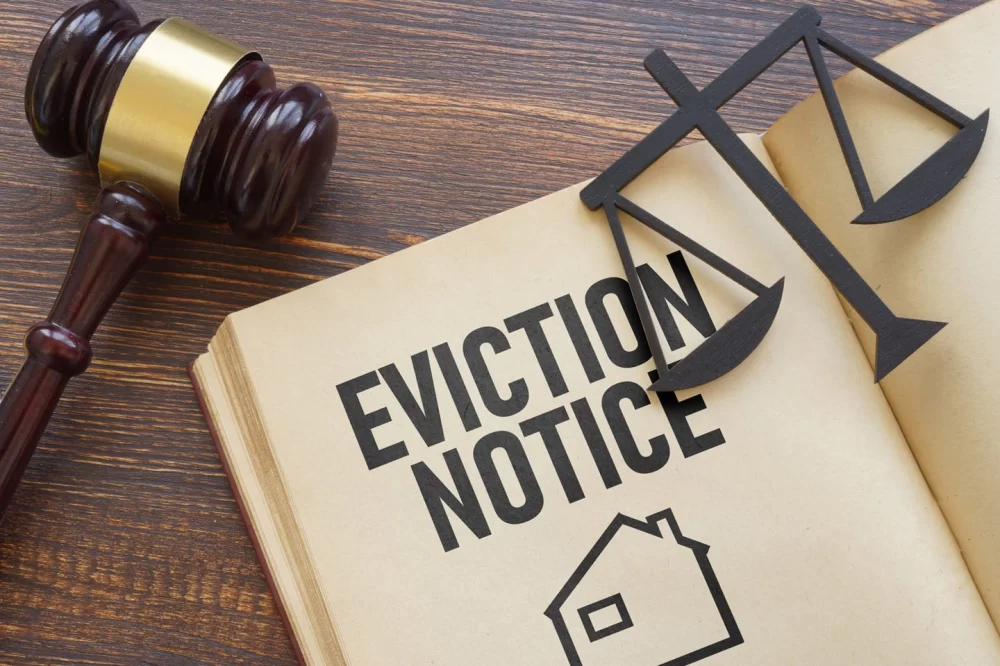- Understanding the Eviction Process
- Legal Requirements for Eviction
- Common Eviction Scenarios and Case Examples
- Tips for Landlords to Avoid Disputes During Eviction
- How Fred Miller Lawyer Can Support You
1. Understanding the Eviction Process
For landlords, managing rental properties comes with challenges, one of the most stressful being the eviction process. Legal advice on landlord eviction process is crucial to ensure that property owners protect their rights without violating tenant protections. Eviction isn’t just about asking a tenant to leave; it involves a carefully regulated legal procedure that must be followed to avoid potential lawsuits or penalties.
The eviction process generally begins when a tenant fails to meet their lease obligations, such as nonpayment of rent or violating lease terms. At this point, landlords need to provide formal notices as required by law, often called “notice to quit” or “pay or quit” notices. Understanding these early steps helps landlords navigate the process smoothly, reducing conflict and misunderstandings.
Landlords who skip steps or attempt informal eviction methods like changing locks or shutting off utilities may face legal consequences. This is why getting solid landlord eviction legal advice early on is vital to protect your property and your interests.
1.1 The Role of Notices and Communication
Effective communication can sometimes prevent eviction altogether. A landlord should deliver all notices in writing, specifying the breach clearly and giving tenants reasonable time to respond or rectify the issue. For example, a 3-day pay rent or quit notice is common for nonpayment, but exact timelines can vary by jurisdiction.
Failing to deliver proper notices or ignoring tenant responses can result in dismissal of eviction cases, costing landlords time and money. Therefore, understanding the legal framework behind these notices is an essential part of the eviction process.
2. Legal Requirements for Eviction
Eviction laws are designed to balance landlord rights with tenant protections, making the process highly regulated. Seeking legal advice on landlord eviction process helps landlords comply with these laws and avoid common pitfalls.
Landlords must file formal eviction proceedings in court after the notice period expires if the tenant does not comply. This step is critical—landlords cannot forcibly remove tenants themselves without a court order.
2.1 Court Procedures and Documentation
After filing, landlords need to present evidence justifying eviction, such as unpaid rent receipts or documented lease violations. Tenants have the right to respond or contest the eviction in court, which makes legal representation beneficial for both parties.
Understanding the procedural requirements, including timelines for court hearings and appeals, is crucial for a successful eviction. Failing to meet procedural requirements can delay the process or result in eviction denials.
2.2 Enforcement of Eviction Orders
Once a court grants an eviction order, landlords must work with law enforcement to enforce the removal legally. Attempting to evict tenants without official enforcement is illegal and may expose landlords to fines or civil suits.
3. Common Eviction Scenarios and Case Examples
To better illustrate the eviction process, consider a real-world example involving a landlord dealing with a tenant who consistently delays rent payments. Despite repeated verbal requests, the tenant fell behind by three months. The landlord issued a formal 3-day notice to pay or quit. After no payment was received, the landlord filed an eviction lawsuit.
During the court hearing, the tenant argued financial hardship, requesting more time. The judge granted a payment plan but warned that failure to comply would lead to eviction. This case highlights the importance of legal advice on landlord eviction process, as understanding tenant rights and court flexibility can save time and money.
3.1 Eviction Due to Lease Violations
Another common scenario involves lease violations like unauthorized pets or property damage. Proper documentation and adherence to notice requirements are essential here to avoid delays or dismissal.
4. Tips for Landlords to Avoid Disputes During Eviction
Proactively managing the eviction process with sound legal advice can prevent costly disputes. Here are some key strategies:
4.1 Keep Detailed Records
Document all communications, payments, and lease breaches thoroughly. This evidence is invaluable if legal action becomes necessary.
4.2 Understand Local Laws
Eviction laws vary widely by state and municipality. Consulting with a qualified attorney ensures compliance with local statutes and avoids missteps.
4.3 Attempt Mediation When Possible
Mediation can help resolve conflicts without litigation, saving time and preserving relationships.
5. How Fred Miller Lawyer Can Support You
If you are a landlord facing the complexities of the eviction process, Fred Miller Lawyer offers expert legal advice tailored to your situation. With extensive experience in landlord-tenant law, the team can guide you through every step—ensuring you understand your rights, meet all legal requirements, and protect your investments.
Whether you are dealing with nonpayment, lease violations, or other tenant issues, professional advice from Fred Miller Lawyer can make the eviction process smoother and more efficient, reducing stress and risk.


 lau and choi pc
lau and choi pc steven flaxman
steven flaxman 7910 woodmont ave bethesda md 20814
7910 woodmont ave bethesda md 20814 alexander segal lawyer
alexander segal lawyer foley and lardner dc
foley and lardner dc mark bederow lawyer
mark bederow lawyer